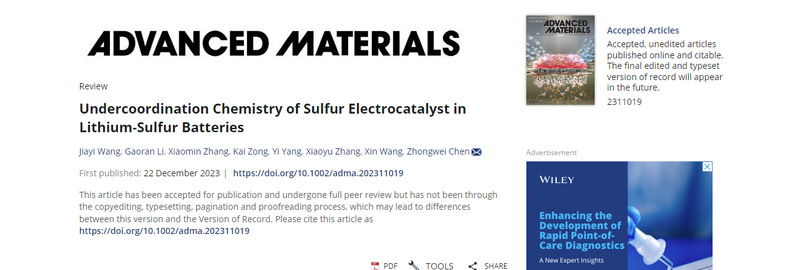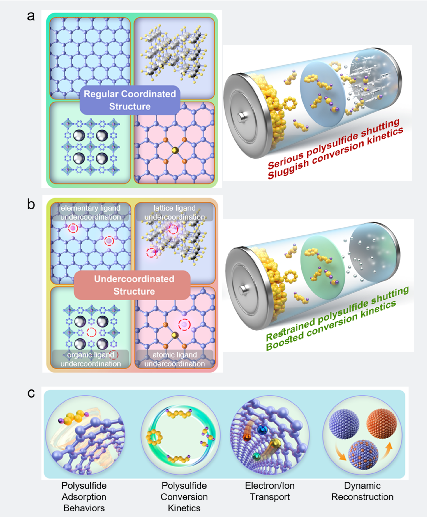

Recently, the Carbon Neutral Research Institute of ZWU, with Zhejiang Wanli University as the first author affiliation, published a review paper entitled “Undercoordination Chemistry of Sulfur Electrocatalyst in Lithium-Sulfur Batteries” in the top international journal Advanced Materials.
Advanced Materials is a top international journal in the field of materials science, which mainly publishes high-quality research articles, reviews, commentaries and outlooks on the frontiers of chemistry and physics of functional materials, with an impact factor of 29.4 in 2023. This is the first time that ZWU has published its research results in Advanced Materials as the first author affiliation. The corresponding authors of the article are Academician Chen Zhongwei and Researcher Wang Xin, and the first author is Dr. Wang Jiayi, a young teacher of our university.
With the continuous upgrading of portable electronic devices, there are higher requirements for the energy density of rechargeable batteries. However, the current commercialized lithium-ion batteries have almost been developed to the theoretical capacity limit and hence unable to meet the growing energy demand of modern technology, so it is particularly necessary to develop new battery systems. Lithium-sulfur batteries, as a new type of lithium-ion batteries, use sulfur as the positive electrode and lithium as the negative electrode to achieve reversible charge and discharge cycles through the oxidation-reduction reaction of sulfur. The theoretical specific capacity of sulfur cathode is as high as 1675 mAh g-1, and when matched with lithium anode, the theoretical energy density can reach 2600 Wh kg-1. Meanwhile, with the advantages of low price, abundant reserves, and environmental friendliness, sulfur is regarded as a promising next-generation high-capacity electrode material. However, the commercialization of lithium-sulfur batteries is still subject to some technical limitations, including the obvious shuttle effect of lithium polysulfide, the sluggish kinetics of sulfur species conversion, and cycling instability. Numerous studies have shown that the introduction of sulfur catalysts into lithium-sulfur battery systems can inhibit the lithium polysulfide shuttle effect, accelerate the conversion of sulfur species, and improve the reaction kinetics. Therefore, modifying sulfur catalysts to improve their catalytic activity has become the focus of lithium-sulfur battery research.
The paper “Undercoordination Chemistry of Sulfur Electrocatalyst in Lithium-Sulfur Batteries” summarizes the latest progress in undercoordination chemistry in sulfur catalyst design, collects typical undercoordination material structures and implementation strategies, and details their potential mechanisms from four aspects: lithium polysulfide adsorption behavior, polysulfide conversion kinetics, electron/ion transport and dynamic reconfiguration. The future development direction of undercoordinated chemistry is also prospected.